Academia Sinica
| 中央研究院 | |
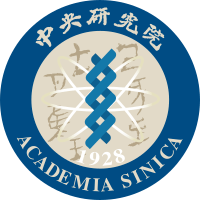 | |
| Agency overview | |
|---|---|
| Formed |
1928 (in Nanjing) 1949 (in Taipei) |
| Headquarters |
Taipei, Taiwan[1] 25°2′45″N 121°36′37″E / 25.04583°N 121.61028°ECoordinates: 25°2′45″N 121°36′37″E / 25.04583°N 121.61028°E |
| Employees | ~5,800[2] (incl. 976 principal investigators, 111 research specialists, 775 post-docs, 2,150 students)[3] |
| Annual budget | 17 billion NTD ($0.55 billion) (2016)[4] |
| Agency executives |
|
| Website |
www |
| Academia Sinica | |||||||||||
| Traditional Chinese | 中央研究院 | ||||||||||
|---|---|---|---|---|---|---|---|---|---|---|---|
| Literal meaning | Central Research Academy | ||||||||||
| |||||||||||
Academia Sinica (AS; Han characters: 中央研究院, literally "central research academy"), headquartered in Nangang District, Taipei, is the national academy of Taiwan. It supports research activities in a wide variety of disciplines, ranging from mathematical and physical sciences, to life sciences, and to humanities and social sciences. As an educational institute, it provides PhD training and scholarship through its English-language Taiwan International Graduate Program in biology, agriculture, chemistry, physics, informatics, and earth and environmental sciences.[5] Academia Sinica is ranked 144th in Nature Publishing Index - 2014 Global Top 200[6] and 22nd in Reuters World's Most Innovative Research Institutions.[7] The current president since 2016 is James C. Liao, an expert in metabolic engineering, systems biology and synthetic biology.[8]
Basic information
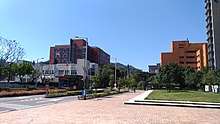
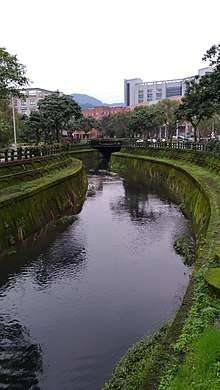

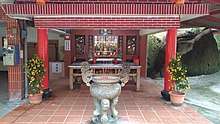
Mission
As the most preeminent academic research institution in Taiwan, Academia Sinica is directly responsible to the Presidential Office, unlike other government-sponsored research institutes which are responsible to relevant Executive Yuan ministries. Thus AS enjoys autonomy in formulating its own research objectives. In addition to academic research on various subjects in the sciences and humanities, its major tasks also include providing guidelines, channels of coordination, and incentives with a view to raising academic standards in the country.
Campuses
Academia Sinica has its main campus located in Nangang District of Taipei City and runs over 40 research stations distributed across the country and throughout the world.[1]
Main campus
The main campus in Nangang was constructed in 1954. In addition to the Central Office of Administration and 28 institutes and research centers, the main campus has 10 museums or memorial halls open to the public, as well as an ecological pond, a forest park, a temple of Earth God (Fwu-Ter temple), and the Sih-Fen Brook (四分溪) that runs through the campus and in the north by the National Biotechnology Research Park.
National Biotechnology Research Park
The National Biotechnology Research Park, finished in 2017, is located about 500 m north of the main campus and 500 m south of the Nankang Software Park, with the Nangang station to the west and the Taipei Nangang Exhibition Center MRT station to the east.[9] It is home to four Academia Sinica centers for translational medicine, innovation, incubation, and bioinformatics service, as well as the Biotechnology Development Center of the Ministry of Economic Affairs, the Food and Drug Administration of the Ministry of Health and Welfare, and the National Laboratory Animal Center of the Ministry of Science and Technology.[9]
National Taiwan University main campus
Three physical sciences institutes, Mathematics, Astronomy, and Atomic and Molecular Sciences, are located in the main campus of National Taiwan University in Gongguan, Da'an District, Taipei. A joint office between the two institutions was established in 2014.
Southern Campus
A campus in the Shalun Smart Green Energy Science City, near the Tainan High Speed Rail station, Guiren District, Tainan,[10] is under construction and is expected to be finished in 2021. The groundbreaking ceremony took place in May 2018 after seven years of planning.[11] The Southern Campus is part of an effort to promote regional balance in the academic landscape of Taiwan and will prioritize research on agricultural biotechnology, sustainable development, and archaeology of early Taiwanese history and culture.[11]
History
The Academia Sinica was founded in 1928 in Nanking, Republic of China, with the first meeting held in Shanghai. After the establishment of the People's Republic of China in 1949, it relocated to Taiwan. In 1954, its main campus was constructed in Jiouhjuang, Nankang, Taipei. The institutes at that time were Mathematics, Philology, and Botany. The second Convocation was held in 1957. In the 2000s, many of the current institutes and research centers were established, partially through reorganization of the old ones. The first PhD program of the AS, the Taiwan International Graduate Program, was inaugurated in 2006.
Organization
Institutes and research centers
Similar to the Max Planck Institutes of Germany,[12] Taiwan's Academia Sinica covers three major academic divisions:[13][3]
|
|
|
 Life Science Road (from right to left: Institute of Biomedical Sciences, Institute of Molecular Biology, and Institute of Biological Chemistry).
Life Science Road (from right to left: Institute of Biomedical Sciences, Institute of Molecular Biology, and Institute of Biological Chemistry). Institute of Plant and Microbial Biology and Agricultural Biotechnology Research Center.
Institute of Plant and Microbial Biology and Agricultural Biotechnology Research Center. Institute of Information Science.
Institute of Information Science. Institute of Chemistry.
Institute of Chemistry. Genomics Research Center.
Genomics Research Center. Institute of Biomedical Sciences.
Institute of Biomedical Sciences.
Research stations
The research stations in Taiwan include:[14]
- Southern Taiwan Science Park Archaeological Station (南科考古工作站)
- Green Island Marine Station (綠島海洋研究站)
- Yuanyang Lake Station (鴛鴦湖工作站), Jianshi, Hsinchu
- Marine Research Station, Jiaosi, Yilan (宜蘭礁溪臨海研究站)
- Dongsha Atoll Research Station, Kaohsiung (東沙環礁研究站)
The research sites abroad include:[15]
- Global Navigation Satellite System (GNSS), Luzon, the Philippines
- Sesoko Station, Okinawa, Japan
- Yuan Tseh Lee Array (YTLA), Mauna Loa, Hawaii, United States
- South-East Asian Time Series Study (SEATS) on the Southeast Asian Sea
Education programs
PhD programs
Joint PhD programs
In general Academia Sinica is a non-teaching institution, but it has very close collaboration with the top research universities in Taiwan, such as National Taiwan University, National Tsing Hua University, National Chiao Tung University, National Yang-Ming University and National Central University. Many research fellows from Academia Sinica have a second appointment or joint professorship at these universities. In addition, Academia Sinica established joint Ph.D. programs[16] in biological sciences with Taiwan's universities, such as the Doctoral Degree Program in Marine Biotechnology with National Taiwan Ocean University.[17] Through these mechanisms, the faculty at the Academia Sinica give lecture courses and supervise graduate students.
Taiwan International Graduate Program (TIGP)

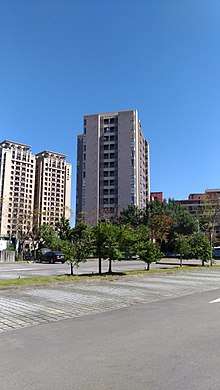
Since 2002, Academia Sinica set up the Taiwan International Graduate Program (TIGP),[5] open to local and international students for Ph.D. programs. All courses at TIGP are conducted in English. Students can choose their advisor among a faculty selected for the program out of outstanding researchers and professors appointed at Academia Sinica or at one of the partner universities (or both). Currently, admittance to the programme guarantees a monthly stipend of 34,000 NTD, roughly $1,200 or €1,050.[5] Applications can normally be sent starting in December and the submission deadline is usually set on March 31, for enrollment in September of the same year. Lectures start around the middle of September and end around the middle of June, with slight variations mostly depending on the partner university's academic calendar.
The TIGP offers Ph.D. programs only in selected disciplines agreed upon by Academia Sinica and its national research universities partners. The program offers doctoral degrees in highly interdisciplinary areas in the physical sciences, applied sciences, engineering, biological and agricultural sciences, health and medical sciences, humanities and social sciences. As of March 2017, Academia Sinica administers 12 such programs with degrees issued from partner universities:[5]
- Chemical Biology and Molecular Biophysics
- Molecular Science and Technology
- Molecular and Biological Agricultural Sciences
- Bioinformatics
- Molecular and Cell Biology
- Nano Science and Technology
- Molecular Medicine
- Earth System Science
- Biodiversity
- Interdisciplinary Neuroscience
- Sustainable Chemical Science and Technology
- Social Network and Human-Centered Computing
Predoctoral programs
TIGP International Internship Program (TIGP-IIP)
Launched in 2009, the TIGP-IIP is an intensive, predoctoral, summer research training program for two months that prepares its participating interns with the necessary knowledge and skills for future research or career development through rigorous hands-on training.[18] Successful applicants from around the world will receive for each month a stipend of 30,000 NTD and a round-trip ticket to Taiwan. The program highlights include internship at an applicant-chosen host lab, visits to Academia Sinica facilities and partner institutions, field trips in Taiwan and basic Mandarin lessons.
Summer internship programs
Many institutes of Academia Sinica offers their own summer internship programs for undergraduate students in Taiwan.
High school program
Academia Sinica also offers a three-year program for gifted and talented high school students interested in the biological sciences. To enroll, students must first pass an entrance exam at the start of 10th grade (first year for Taiwanese senior high schools). During 10th grade, students attend expert lectures and visit the various laboratories on campus. During 11th and 12th grade, students enter a lab of their choice and gain hands-on experience in the various fields of biological sciences. To graduate from the program, an academic paper must be submitted and presented in front of professors and peers.
Postdoctoral scholars
Academia Sinica has a high number of both domestic and international postdoctoral fellows. They are funded by grants of Ministry of Science and Technology (Taiwan) or by Academia Sinica. The latter, the Academia Sinica Postdoctoral Fellow Program, consists of two tracks: Regular Postdoctoral Scholars (starting annual salary: NT$810,351 (US$28,100), additional benefits depending on the principal investigator) and Academia Sinica Postdoctoral Scholars (annual salary up to NT$ 1,167,278 (US$40,000), plus round-trip ticket and research subsidy of US$4,500)[19][20]
Convocation
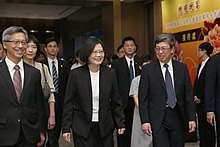
The Convocation of the Academia Sinica consists of 281 Academicians, including 105 domestic and 176 overseas appointed scientists.[21] Seven Academicians of Academia Sinica are Nobel laureates.[22] Academician membership is an honorary lifetime privilege without remuneration. They do not necessarily perform research or reside at the Academia Sinica campus. According to their own expertise, academicians are grouped into three divisions: Mathematics and Physical Sciences, Life Sciences, and Social Sciences and Humanities. A maximum number of ten new members is allocated to each of the three divisions during the biennial Convocation. The eligibility of the academicians is not restricted to the residents of Taiwan or ROC citizens. More than half of the academicians are overseas scholars and scientists.
At the Convocation, the academicians elect new academicians and honorary academicians, and elect members to the Council of Academia Sinica. The Convocation can also recommend policies to the government on academic research.[23] The academicians also have responsibilities to carry out research at the government's request, although the government has never requested any task.
Academicians who reside(d) at Academia Sinica
Leadership
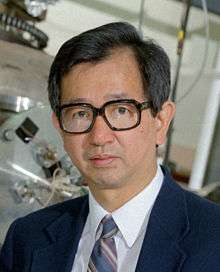
The president of the Academia Sinica is appointed by the President of ROC from three candidates recommended by the Council Meeting. The president of the Academia must be an Academician. After the appointment, the president serves a five-year term and can serve up to two consecutive terms.
Academia Sinica's current President is Dr. James C. Liao, a biochemist, who replaced Dr. Chi-Huey Wong, a biological chemist and the Parsons Foundation Professor and Chair of the Department of Chemical and Biomolecular Engineering at the University of California, Los Angeles, as the 11th president on 21 June 2016. The list of past Presidents also includes Hu Shih, a philosopher and essayist, and a key contributor to Chinese liberalism and language reform in his advocacy for the use of vernacular Chinese, as well as an influential redology scholar and holder of the Jiaxu manuscript (Chinese: 甲戌本; pinyin: Jiǎxū běn) until his death. The fifth president, Yuan T. Lee, won the Nobel Prize in Chemistry for "contributions to the dynamics of chemical elementary processes".
Presidents
- Hu Shi (1958–1962)
- Wang Shih-Chieh (1962–1970)
- Chien Shih-Liang (1970–1983)
- Ta-You Wu (1983–1994)
- Yuan T. Lee (1994–2006)
- Chi-Huey Wong (2006–2016)
- James C. Liao (2016-)
Journals associated with Academia Sinica
Academia Sinica currently sponsors the following journals:
- Botanical Studies
- Zoological Studies
- Language and Linguistics
- Statistica Sinica
- Academia Sinica Law Journal
- Taiwan Journal of Anthropology
- Academia Economic Papers
- Bulletin of the Institute of Modern History, Academia Sinica
- Journal of Social Sciences and Philosophy
See also
References
- 1 2 "Academia Sinica E-book".
- ↑ 中央研究院 常見問題集:三、在中研院工作的人都是中研院院士嗎?. Academia Sinica.
- 1 2 Budget, Accounting and Statistics Office, Academia Sinica, Taiwan
- ↑ 立委質疑中研院定位不明 廖俊智以開飛機巧妙回應. LTN News.
- 1 2 3 4 Taiwan International Graduate Program, Academia Sinica, Taiwan.
- ↑ "Nature Index tables".
- ↑ "World's Most Innovative Research Institutions".
- ↑ "Google Scholar profile of James C. Liao".
- 1 2 "National Biotechnology Research Park brochure" (PDF).
- ↑ Southern Campus of Academia Sinica
- 1 2 "Expanding R&D capacity into southern Taiwan, the Southern Campus of Academia Sinica officially breaks ground".
- ↑ "Institute - Max-Planck-Institute". Max-Planck-Gesellschaft. Max-Planck-Gesellschaft. 2017. Retrieved 12 March 2017.
- ↑ About the Academia Sinica
- ↑ 中央研究院 常見問題集:二、中研院目前有哪些大型的研究計畫?
- ↑ Global Research Base of Academia Sinica
- ↑ Academia Sinica PhD Degree Programs
- ↑ NTOU Doctoral Degree Program in Marine Biotechnology
- ↑ TIGP International Internship Program
- ↑
- ↑ Guidelines for Postdoctoral Fellows Program at Academia Sinica
- ↑ Convocation of the Academia Sinica, Academia Sinica, Taiwan.
- ↑ Nobel Prize laureates, Academia Sinica, Taiwan.
- ↑ "Academia Sinica Handbook for International Scholars" (PDF). Retrieved 12 July 2017.
External links
| Wikimedia Commons has media related to Academia Sinica. |
- Official website (in English)/(in Taiwanese Mandarin)
- Taiwan International Graduate Program (TIGP)